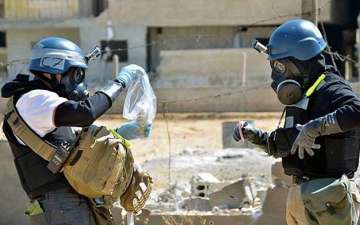Russia has vetoed a US-sponsored UN resolution that would extend the work of inspectors seeking to determine who is responsible for chemical weapons attacks in Syria, accusing the United States of calling the vote "to show up and dishonour Russia."
Russia's UN Ambassador Vassily Nebenzia tried unsuccessfully to postpone the vote until next month, after the joint body comprising investigators from the UN and the chemical weapons watchdog issues a report on October 26.
The resolution was then put to a vote on Tuesday and received 11 "yes" votes, two "no" votes from Russia and Bolivia, and two abstentions.
Nebenzia said Russia has criticised the Joint Investigative Mechanism but doesn't want it terminated. It wants its mandate amended.
Russia, a close ally of Syria, has criticiSed the Joint Investigative Mechanism program.
US Ambassador Nikki Haley has pressed for a vote before the report.
She said on Wednesday there was "overwhelming support" among Security Council members to extend the inspectors' mandate. But she said Russia wants first to see if their report blames Syria for the Khan Sheikhoun attack. In that case, she said, Moscow will have no faith in the joint investigative body of the Organization for the Prohibition of Chemical Weapons.
The attack in Khan Sheikhoun sparked outrage around the world as photos and video of the aftermath, including quivering children dying on camera, were widely broadcast.
The United States blamed the Syrian military for the attack and launched a punitive strike days later on the Shayrat air base where it said the attack was launched. Syrian President Bashar Assad has denied using chemical weapons
A fact-finding mission by the Organization for the Prohibition of Chemical Weapons reported on June 30 that sarin nerve gas was used in the Khan Sheikhoun attack.
But the mission wasn't authorized to determine responsibility. That job was given to the Joint Investigative Mechanism.
Russia has accused the United States and its Western allies of rushing to judgment and blaming the Syrian government for sarin use in Khan Sheikhoun. It has also criticised the June 30 report by the fact-finding mission as "very biased."
The JIM inspectors determined last year that the Syrian government was behind at least three attacks involving chlorine gas and that the Islamic State extremist group was responsible for at least one involving mustard gas.
Latest World News

